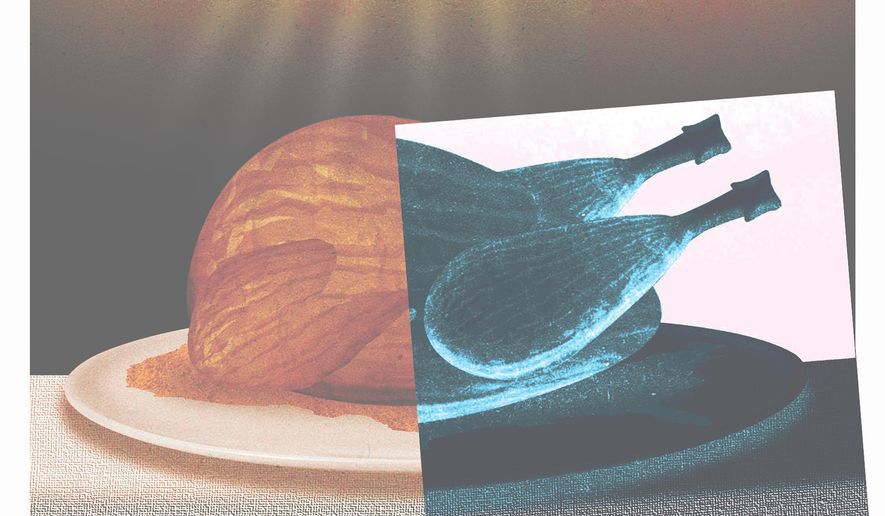OPINION:
In 1621, Richard Warren, almost certainly a refugee from debtors prison, scuffled to survive on the western edge of the North Atlantic along with the Pilgrims at Plymouth. His wife and their five children remained in England, as almost half of the small contingent of 102 souls died in that first year from disease and privation.
Despite this, or perhaps because of it, Warren joined the surviving Pilgrims in thanking God for bringing them to what would become the United States.
They were not alone in offering those thanks.
The first Thanksgiving on American soil probably occurred in May 1541 near Canyon, Texas, where Father Juan de Padilla said Mass for an army of 1,500 soldiers under the command of conquistador Francisco Vasquez de Coronado. Or it may have occurred on Sept. 8, 1565, when Father Francisco Lopez said a Mass for the 800 newly arrived Spanish colonists in St. Augustine, Florida.
Among the English, the leader of the settlers who landed at Berkeley Hundred (in present-day Henrico County, Virginia) on Dec. 4, 1619, commanded: “We ordaine that this day of our ships’ arrival, at the place assigned for plantation, in the land of Virginia, shall be yearly and perpetually kept holy as a day of Thanksgiving for Almighty God.”
Despite the competition, the Pilgrim celebration remains the dominant narrative of Thanksgiving in our society, and probably for good reason. In 1621, in the wake of a bountiful harvest after a year of terrible sickness and unimaginable hardship, the Pilgrims set aside a day to give thanks to God for all of it.
Thanksgiving for bounty? Absolutely. Thanksgiving for sickness and hardship? Again, absolutely.
The Pilgrims rightly believed that everything we receive is a gift from God, both the events and people we immediately recognize as good and the events and people in which we have trouble seeing the good.
Nowadays on Thanksgiving Day, we endure litanies of whatever happy things have happened to relatives, friends and famous people. Worse still, it’s never clear to whom or what they are thankful. How often is the Author of All Things mentioned?
The reality is that bad things happen to all of us, and for reasons we don’t always understand, God lets them happen. Our lives are not solely our own; we did not create ourselves, nor did we create the universe in which we live. Consequently, we are rarely in a position to determine which experiences are good and which are bad.
Many of the bad experiences people endure are also the richest opportunities for learning and for growth, although they may not be understood as such when in the moment. Kierkegaard wrote, “Life can only be understood looking backward, but it must be lived [looking] forward.”
The Pilgrims knew all this and were grateful not for the harvest or the friendly Indians or whatever. They were grateful for God’s providential, watchful and caring love, however that was manifested in their lives.
The word they chose to describe themselves — “pilgrim” — is ultimately derived from the Latin “peregrinus,” which simply means wanderer. They were animated by an understanding that we are all wanderers here. They were well familiar with St. Paul’s admonition in his letter to the Ephesians that we “have not here a lasting city.” Everything we see and touch will one day cease to be. The only things that last are the divine and whatever share of the divine we have curated through our lives.
These are uncomfortable facts for some; for others, they are the source of comfort and resilience. Our own destiny, and that of our nation, are, in many respects, in the hands of a loving and just God.
This brings us back to Richard Warren. His wife and children joined him in 1623, and they had two more together before he died in 1628. His children survived into adulthood and had large families. It is estimated that 40% of those who claim ancestors on the Mayflower (including me) are related to him.
All of us remain grateful for his sacrifice and suffering in those first difficult moments on this continent — moments that eventually and with patience yielded fruit a hundredfold.
This Thanksgiving, think about Richard Warren and the millions of others who have struggled and still struggle to improve their lives and those of their children, neighbors and nation. Make sure to thank the Author of All Things for these people and for everything you’ve been given — both the good and bad.
• Michael McKenna, a columnist for The Washington Times, co-hosts “The Unregulated Podcast.” He was most recently a deputy assistant to the president and deputy director of the Office of Legislative Affairs at the White House.




Please read our comment policy before commenting.